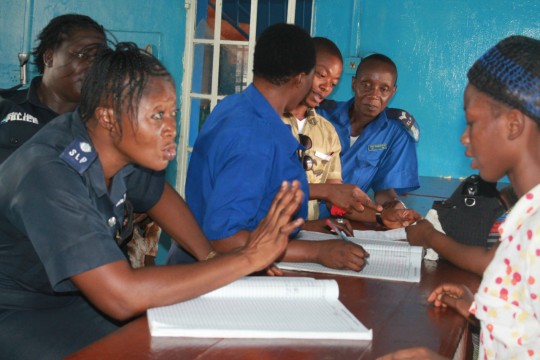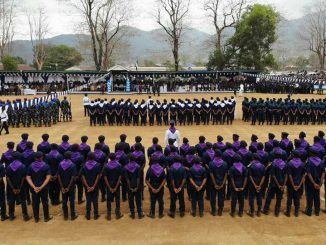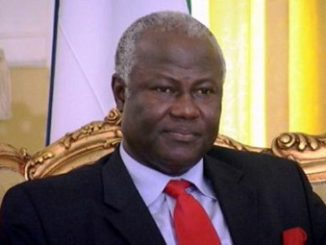
The IPCB will ensure that the Police serves the country well, and build citizen’s trust in the Police.© UNDP Sierra Leone
The President of Sierra Leone Ernest Bai Koroma has said that the launch of Sierra Leone’s Independent Police Complaints Board (IPCB) will “Ensure greater accountability of the police to the people of Sierra Leone” at the Miatta Conference hall in Freetown on Tuesday.
The President made these comments when launching the Complaints Board in the presence of young secondary school girls, several senior ministers, the Attorney General, the Inspector General of Police, diplomats and civil society members. President Koroma noted that with the new institution available to investigate complaints against the police “Citizens now have access to a prompt and transparent process in handling and investigating complaints against the police.”
President Koroma added that the launch of the IPCB demonstrates Sierra Leone’s readiness to improve on its democracy and accountability mechanisms as well as shows marked improvement in the governance of the Sierra Leone Police. He added that “Building civilian oversight mechanisms, promoting accountability and sustaining peace are central pillars of our actions…our launch of this Independent Police Complaints Board is a central component of this action on accountability.”
With funding from the Peace Building Fund and technical support from United Nations Development Programme (UNDP) and the Access to Security and Justice Programme (ASJP), the IPCB will complement the Police’s own internal investigation unit – the Complaints, Discipline and Internal Investigations Department (CDIID) – that exists within the Sierra Leone Police force. The IPCB is led by strong professionals with previous experience from other agencies like the Anti-Corruption Commission.
The IPCB will not only investigate allegations of abuse of police brutality but will also track complaints over time to establish any trends or pattern of abuse by police (including in specific regions or districts) in order for more detailed investigation of those trends for more structural response to addressing these complaints from citizens. This will allow for addressing systemic challenges afflicting the Sierra Leone Police force.
UNDP Country Director in Sierra Leone, Sudipto Mukerjee said UNDP’s single most important motivation for supporting this initiative is in line with the statement of the previous UN Secretary General that “There is no development without security and there is no security without development.”
Mr. Mukerjee further called for more improvements beyond procedural and policy change, but also “behaviour and attitudes, rooted in best practice and principles of democratic policing, which in turn will increase trust and confidence from communities.” He expressed UNDP’s support of the government’s vision of transforming the police “From a Police Force to a Police Service.”
Mr. Mukerjee also commended the Sierra Leone Police leadership for their cooperation adding that the Sierra Leone Police have “fully embraced the principle of independent oversight and accountability and provided advice and support when required towards establishing the IPCB.”
Speaking after the event, civil society activist and Executive Director of Centre for Accountability and Rule of Law (CARL), Mr. Ibrahim Tommy, noted that the launch of the IPCB is a “major step forward towards a fairer and more accountable police force as well as a more independent investigation mechanism that will enhance trust both from members of the public and police officers themselves.”
UNDP’s support to the IPCB came out of a joint initiative between UNDP and the UN Peacebuilding mission to Sierra Leone, UNIPSIL – which closed in March 2014 and the initiative was tailored to ensure ongoing support for the government’s safety and security reform agenda for an effective independent policing oversight body in line with the governments’ commitments made in the Agenda for Change in 2008-2012.
For more information and media requests:
UNDP Communications Unit, 55 Wilkinson Road, Freetown. Email: [email protected]



